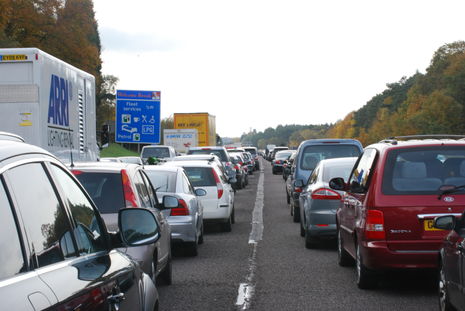Research shows risk of gridlocked roads and business closures in Cambridgeshire
A shift from train to road commuters may lead to 2 million extra hours of traffic congestion

A recent report conducted by WPI Economics in partnership with the Rail Delivery Group (RDP) has shown the impact of reduction in train travel on Cambridgeshire and Peterborough with regards to congestion and local business.
During the pandemic most commuters worked from home. Now, as life returns to normal, more and more people have returned to the office. The report tracks the new commuting habits following a return to normal life. Whilst the number of car commuters has returned to pre-pandemic levels, train commuters represent just 33% of pre-pandemic levels.
Andy Bagnall, director general of the RDG, says that “for many former Monday to Friday commuters the future is undoubtedly going to be a mix of home and office working but the extent to which people return to the workplace and whether or not they take the train to get there is going to be crucial.”
This is particularly concerning given that new research shows that a 20% shift from rail to road commuters will lead to 2 million extra hours of traffic congestion. On a national scale, the shift in commuters will see an extra 300 million hours of congestion.
The consequences, however, are not solely limited to increased road congestion. Rail passengers passing through, and arriving, in Cambridgeshire and Peterborough are essential to local business. New data reveals that prior to the pandemic, rail passengers spent a total of £670 million on food and drink, £470 million on shopping and £330 million on entertainment.
A public survey in the More Than a Journey report reveals people’s concerns in response to the permanent 20% drop in rail passengers. The dominant three public concerns were increased congestion, reduced air quality and harm to city centres, all of which would be pronounced in a city such as Cambridge.
Furthermore, local business expressed a worry regarding congestion around the business and a subsequent drop in customer numbers. The reduction in train commuters therefore represents a significant blow to the local economy in the respective regions. “When people take the train it’s more than a journey - it will impact the future of thousands of small businesses, local air quality and the government’s net zero ambitions”, states Andy Bagnall.
 News / Eight Cambridge researchers awarded €17m in ERC research grants27 December 2025
News / Eight Cambridge researchers awarded €17m in ERC research grants27 December 2025 News / Downing investigates ‘mysterious’ underground burial vault 29 December 2025
News / Downing investigates ‘mysterious’ underground burial vault 29 December 2025 News / News in Brief: carols, card games, and canine calamities28 December 2025
News / News in Brief: carols, card games, and canine calamities28 December 2025 Sport / Hard work, heartbreak and hope: international gymnast Maddie Marshall’s journey 29 December 2025
Sport / Hard work, heartbreak and hope: international gymnast Maddie Marshall’s journey 29 December 2025 Interviews / Meet Juan Michel, Cambridge’s multilingual musician29 December 2025
Interviews / Meet Juan Michel, Cambridge’s multilingual musician29 December 2025







